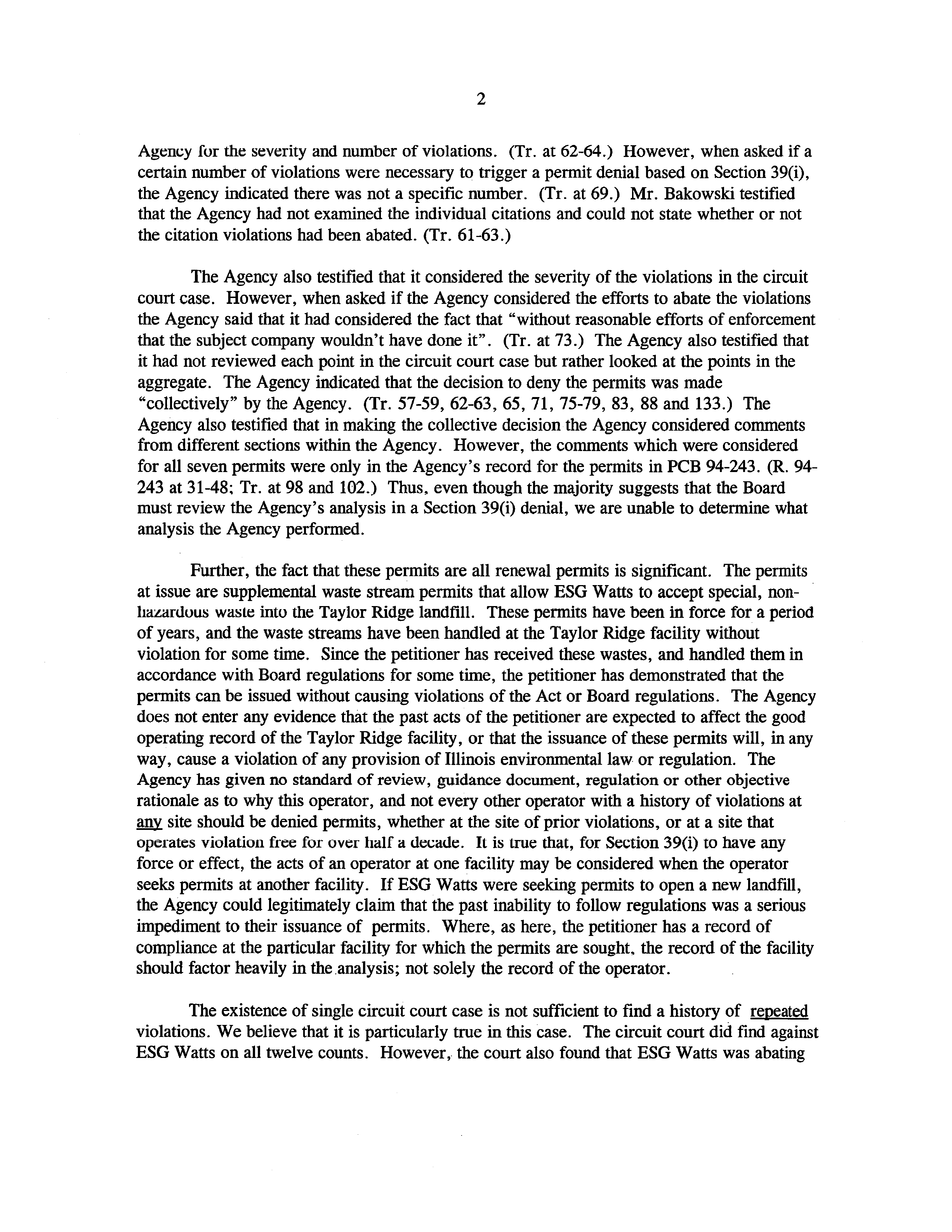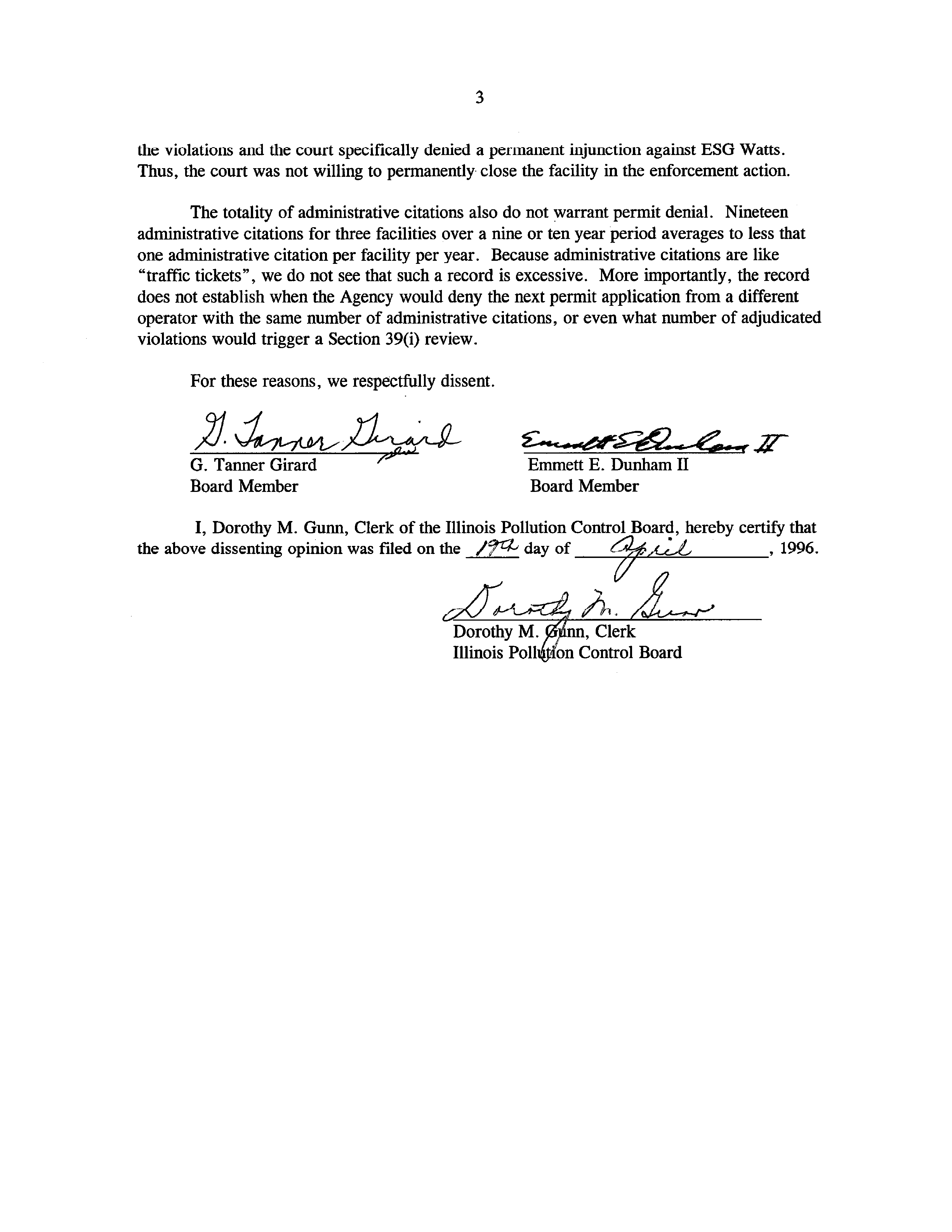ILLINOIS POLLUTION CONTROL BOARD
March21,
1996
ESG WATTS,
INC.,
an Iowa Corporation,
)
)
PCB
94-243
Petitioner,
)
94-306
)
94-307
v.
)
94-308
)
94-309
ILLINOIS ENVIRONMENTAL
)
95-133
PROTECTION AGENCY,
)
95-134
)
(Consolidated)
Respondent.
)
(Permit Appeal
-
Land)
DISSENTING OPINION
(by
G.T. Girard and E.
Dunham):
We respectfully dissent from the majority opinion
and order in this
matter
The record
in this
consolidated proceeding does not
support the Agency’s denial pursuant to
Section 39(i)
of the Act of several permits based on ESG Watts’ prior history as a landfill operator.
We
agree with the dissenting opinion of Board mcmbcr Mcycr,
but wc also believe that the
sole
legitimate rationale for the Agency denial of ~pypermit under Section 39 ofthe Act is the
probable violation of the Act or Board Regulations.
The
denial ofa permit under
Section 39(i)
of the Act is no exception.
The plain language of Section 39(i) of the Act allows the Agency
to
include in its evaluation of an operator’s history
administrative citations and circuit court
cases where the adjudicated violations
are
for facilities other than the specific facility at issue
in a permit application.
However, denial of a permit for prior bad acts obviously
is intended
to prevent
future
bad acts,
and
cannot be applied by the
Agency or the
Board to punish an
operator for those prior adjudicated
violations.
In previous cases before the Board (People v.
James Watts, PCB 94-127 (November 3,
1995)) and the circuit courts (People v.
Watts
Trucking, No. 9l-CH-242
(Cir.
Ct.
Sangamon Cty February 2,
1994)), the Agency
has tried
Unsuccessfully to have the operating permits of ESG Watts revoked.
Ineach adjudieatcd ease,
they failed.
The Agency is now attempting to
add to the penalties already assessed by denying
permit renewals at a facility that has beenremarkably free of violations for a period of
5
to 6
years.
This is far beyond the Agency’s
authority and is among the most draconian penalties in
the arsenal of the Agency.
(IEPA v.
IPCB, 252 Ill.
App.
3d 828,
624 N.E.2d 402 (3rd Dist.
1993).)
Section 39(i) requires the
Agency to evaluate the operator’s history
before granting or
denying a permit.
Clearly, the legislature intended that the entirety of an operator’c record he
examined prior to the
issuance of a permit.
However, in this case it does not appear that the
Agency examined the entirety ofthe operator’s experience.
In fact, it is not clear from the
record before the Board what the Agency did consider.
The most oft-repeated phrase to
describe the Agency’s analysis in this Section 39(i) review was that the decision to deny
the
permits was made “collectively”.
(Tr.
57-59,
62-63,
65,
71,
75-79,
83,
88 and
133.)
Mr.
Bakowski did testify that the administrative citations were
examined
“collectively” by the
2
Agency for the severity and number of violations.
(Tr.
at 62-64.)
However, when asked if a
certain number of violations were necessary to trigger a permit denial based on Section 39(i),
the Agency indicated there was not a specific number.
(Tr.
at 69.)
Mr. Bakowski testified
that the Agency had not examined the individual citations and could not state whether or not
the citation violations had been abated.
(Tr. 61-63.)
The Agency also testified that it considered the severity of the violations
in the circuit
court case.
However, when asked if the Agency considered the efforts
to abate
the violations
the Agency said that it had considered the fact that “without reasonable efforts of enforcement
that the subjectcompany wouldn’t have done it”.
(Tr.
at 73.)
The Agency also testified that
it had not reviewed each point in the circuit court case but rather looked at the points in the
aggregate.
The Agency indicated that the decision to deny the permits was made
“collectively” by the Agency.
(Tr.
57-59,
62-63,
65,
71,
75-79, 83,
88
and
133.)
The
Agency also testified that
in making the collective decision the Agency considered comments
from different
sections within the Agency.
However, the comments which were considered
for all seven permits were only in the Agency’s record for the permits in PCB 94-243.
(R. 94-
243
at 31-48;
Tr.
at 98
and 102.)
Thus, even though the majority suggests that the Board
must review the Agency’s analysis in a Section 39(i) denial,
we are unable to determine what
analysis the Agency performed.
Further, the fact that these permits are all renewal permits
is significant.
The permits
at issue are supplemental waste stream permits that allow ESG Watts to accept special, non-
hazardous
waste into the Taylor Ridge landfill.
These permits have been in force for a period
of years,
and the waste streams have been handled at the Taylor Ridge facility without
violation for some time.
Since the petitioner has received these wastes, and handled them in
accordance with Board regulations for some time,
the petitionerhas demonstrated that the
permits can be issued without causing violations ofthe Act
or Board regulations.
The Agency
does not enter any evidence that the past acts of the petitioner are expected to
affect the good
operating record ofthe Taylor Ridge facility, or that the issuance ofthese permits will,
in any
way, cause a violation ofany provision of Illinois environmental law or regulation.
The
Agency has given no
standard of review, guidance document,
regulation or other objective
rationale as to
why this operator, and not every other operator with a history ofviolations at
~j~ysite should be deniedpermits,
whether at the site of prior violations,
or at a site that
operates violation free for over half a decade.
It is true that, for Section 39(i) to have any
force or effect,
the acts of an operator at one facility may be considered when the operator
seeks permits at another facility.
If ESG Watts were seeking permits
to open a new landfill,
the Agency could legitimately claim that the past inability to follow regulations was a serious
impediment to
their issuance of
permits.
Where, as here, the petitioner has a record of
compliance at the particular facility for which the permits
are sought, the record of the facility
should factor heavily in the analysis;
not solely
the record of the operator.
The existence of single circuit court case is not sufficient to find a history of
repeated
violations.
We believe that it is particularly true in this case.
The circuit court did
fmd against
ESG Watts on
all twelve counts.
However,, the court also found that ESG Watts was abating
3
the
violations
and the
court specifically denied a permanent injunction against ESG Watts.
Thus, the court was not willing
to permanently close the facility
in the enforcement action.
The totality of administrative citations also
do not warrant permit denial.
Nineteen
administrative citations for three facilities over a nine or ten year period averages to
less that
one administrative citation per facility per year.
Because administrative citations are like
“traffic tickets”, we do not see that such a record is excessive.
More importantly,
the record
does not establish when the Agency would deny the next permit application from a different
operator with the same number of administrative citations,
or even what number of adjudicated
violations would trigger a Section 39(i) review.
For these reasons,
we respectfully dissent.
G. Tanner Girard
Emmett E. Dunham II
Board Member
Board Member
I, Dorothy M.
Gunn, Clerk of the Illinois Pollution Control Board, hereby certify that
the above dissenting opinion was filed on the
/7ZZ
day
of _____________________,
1996.
44.
Dorothy M. ~dnn~ Clerk
Illinois
Polh~JAonControl Board



